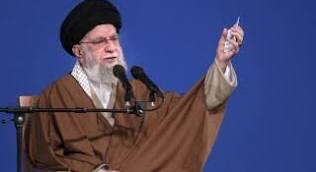Welcome to our blog ! Here you will find news and updates about sports, politics, artists, and everything that is trending right now. Enjoy the content and stay up to date with the latest trends! Stay Informed with BoomViral News.
Iran’s Supreme Leader Khamenei Reemerges, Warns US Against Future Attacks in First Post-Ceasefire Address
Suraay
6/26/20253 min read


DUBAI, United Arab Emirates (AP) — Iran’s Supreme Leader Ayatollah Ali Khamenei declared Thursday that his country had "slapped America in the face" by striking a U.S. airbase in Qatar and issued a warning against further attacks, marking his first public remarks since the ceasefire agreement with Israel.
Khamenei’s pre-recorded speech, broadcast on Iranian state television, was his first public appearance since June 19 and contained sharp threats against the United States and Israel, the Islamic Republic’s long-standing adversaries.
The 86-year-old leader, known for his fiery speeches to Iran’s population of over 90 million, appeared more fatigued than in previous appearances, speaking with a hoarse voice and occasionally stumbling over his words.
Khamenei downplayed Sunday’s U.S. strikes on three Iranian nuclear sites, which used bunker-buster bombs and cruise missiles. He dismissed President Donald Trump’s claim that the attack had "completely obliterated" Iran’s nuclear program as an exaggeration.
"They achieved nothing significant," Khamenei said. His 10-minute address made no mention of the current state of Iran’s nuclear facilities following the extensive U.S. and Israeli strikes.
His portrayal of Monday’s strike on the U.S. base in Qatar contradicted American accounts, which described it as a limited attack with no casualties.
The White House responded to Khamenei’s remarks, accusing him of trying to "save face."
"Any rational observer knows the truth—the precision strikes were overwhelmingly successful," press secretary Karoline Leavitt told reporters.
IAEA Confirms Damage to Iranian Nuclear Sites
Rafael Grossi, head of the International Atomic Energy Agency (IAEA), reiterated Thursday that the damage from U.S. and Israeli strikes on Iran’s nuclear facilities was "very, very substantial" and likely rendered centrifuges inoperable.
"‘Annihilated’ may be too strong, but the damage is enormous," Grossi told French broadcaster RFI. The IAEA has yet to be granted access to inspect the affected sites.
Iranian Foreign Ministry spokesperson Esmail Baghaei acknowledged Wednesday that "our nuclear facilities have undoubtedly suffered severe damage."
Khamenei Accuses U.S. of Intervening to Save Israel
The Iranian leader claimed the U.S. only entered the conflict because it feared Israel would face total destruction otherwise.
"They intervened to save them but gained nothing," he said.
Khamenei framed the Qatar strike as a show of strength, asserting that Iran "has access to key U.S. bases in the region and can strike them whenever necessary."
"The Islamic Republic emerged victorious and delivered a retaliatory slap to America’s face," he declared, adding, "This action can be repeated if needed."
Trump dismissed Iran’s retaliation as a "very weak response," stating the U.S. had received advance warning and that no casualties occurred.
Ceasefire and Return to Normalcy in Iran
On Thursday, Iran partially reopened its airspace—closed since the war began—while shops in Tehran resumed business and traffic returned to the streets.
Official figures report 606 Iranian deaths and 5,332 wounded in the conflict. A Washington-based human rights group, however, estimated at least 1,054 killed and 4,476 injured, including civilians and security personnel.
In Israel, at least 28 people died and over 1,000 were wounded. Israeli authorities stated that 90% of the 550+ missiles Iran fired were intercepted, while Israel struck more than 720 Iranian military targets and eight nuclear-linked sites.
Potential U.S.-Iran Talks
Trump said American and Iranian officials would meet next week, raising cautious hopes for a longer-term peace.
Iran has not confirmed the talks, though U.S. Middle East envoy Steve Witkoff noted direct and indirect communication between the two nations. A sixth round of negotiations, scheduled earlier this month in Oman, was canceled after Israel’s attack.
In a sign of continued defiance, Iran’s parliament fast-tracked a bill Wednesday to suspend cooperation with the IAEA, underscoring its refusal to abandon its nuclear program.